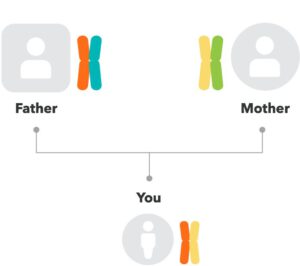There’s a time when all of us settle down, but Robert isn’t there quite yet.
He’s 29, single and has a good job as an architect. He’s in no rush, but all the same that hasn’t stopped him from at least thinking about his future and what comes next. In part that’s why he tested with 23andMe.
“I was interested in learning more about my ancestry, especially within Europe,” said Robert, who lives in Maryland. “I was also interested in learning any health information that could help me plan my life better, especially since I’m at an age when having a family is on the horizon.”
His results revealed a few surprises about his ancestry, but it was the health information that he viewed as invaluable not just for his future, but also to explain something about his sister, who he said was born profoundly deaf. His test showed that Robert is a carrier for an inherited form of hearing loss.
“The cause was unknown but genetic hearing loss was always low on our list of possible reasons because no one else in our family is deaf,” Robert said. “They assumed it was not genetic, so it was always a mystery.”
The family speculated that perhaps her deafness was caused by a fever during infancy, or something his mother may have been exposed to or even his father being in areas that were sprayed with Agent Orange during the Vietnam War. The family didn’t know so they were left to speculate about what caused Robert’s sister to be deaf.
But Robert believes his 23andMe results may offer a plausible explanation. His test revealed that he is a carrier for GJB2-related nonsyndromic hearing loss and deafness, DFNB1, an inherited form of hearing loss.*
To be affected a person must have two variants in the GJB2 gene, but Robert inherited just one copy, meaning he is only a carrier.
Because the condition is nonsyndromic – meaning it lacks other symptoms – detecting it at birth in the past was exceedingly difficult. Recent advances in universal newborn hearing screening, however, have made this and other forms of congenital deafness easier to detect. When Robert’s sister was born the family didn’t have access to those tests.
“Finding out that I am a carrier may shed some light on my sister’s condition,” Robert said.
But since she hasn’t had a genetic test for the condition, he can only assume his sister may have gotten two copies, one from each of their parents.
For Robert, his results are important, he said. If, or when, he decides to have a family, knowing that he’s a carrier is something he’d want to share with his partner. That kind of knowledge is power, but Robert understands not everyone would feel the same way. Not everyone would want to know.
“Everyone is different in the way they handle that sort of news,” he said.
Robert also said that it makes a lot of sense to talk to his doctor or medical professional at some point about the results and how to best use what he’s learned.
Still he feels better knowing.
“I am glad I received this information,” Robert said. “The results were a little sobering at first, but I think it will help me plan for a better life in the long run.”
*23andMe’s carrier status tests can be used to determine carrier status in adults from saliva collected using an FDA-cleared collection device (Oragene ·DX model OGD-500.001), but cannot determine if you have two copies of the genetic variant. Each test is most relevant for people of certain ethnicities. The tests are not intended to diagnose a disease, or tell you anything about your risk for developing a disease in the future. On their own, carrier status tests are not intended to tell you anything about the health of your fetus, or your newborn child’s risk of developing a particular disease later in life. The Nonsyndromic Hearing Loss and Deafness DFNB1 (GJB2-related) carrier status test is indicated for the detection of 2 variants in the GJB2 gene and is most relevant for people of Ashkenazi Jewish and European descent.



